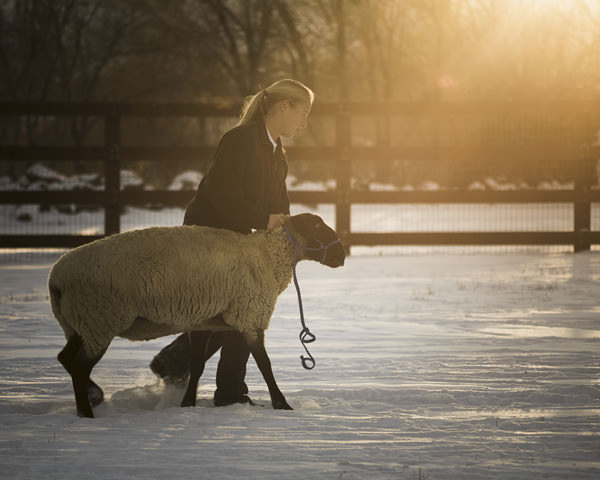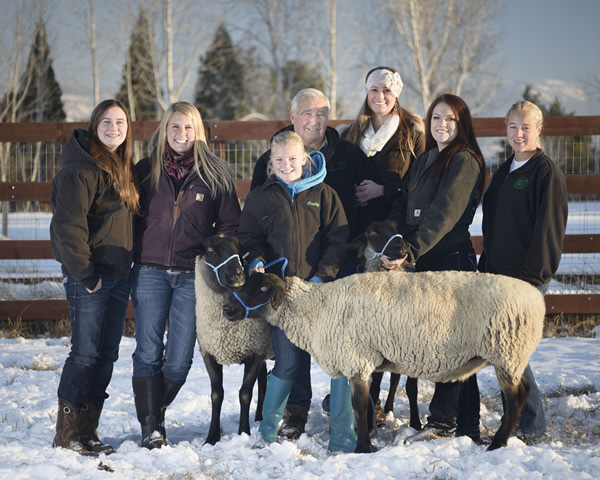cover
A GOOD SHEPHERD
Abel Mendeguia mentors Reno 4-H youths.
WRITTEN BY MARNIE MCARTHUR
PHOTOS BY ASA GILMORE
For nearly 50 years, Basque sheepherder, Abel Mendeguia, never left his sheep. Day after day in the mountains of Eastern Nevada, the high desert near Virginia City, and the Sierra Nevada near Castle Peak and Lake Tahoe, he practiced patience, tolerance, and a good work ethic, values he shares today with young people in Nevada 4-H in Reno.
From Spain to America
In 1951, governors from the western states went to Washington, D.C., on behalf of ranchers who needed help with their sheep. Three hundred young men were recruited from small Basque villages where there was no work and flown to the United States for pre-arranged jobs. Mendeguia and his three brothers were among them. He was 20 years old when he arrived in Elko, Nev.
“I had never been farther from home than seven kilometers when I walked a cow to auction in the next village,” Mendeguia says.
In Lesaka, a small town in Spain, the Mendeguia family owned 45 sheep. Once he was in Nevada, his first job in the Ruby Mountains was as a shepherd of 2,400. He was given a burro and a dog and sent off to the mountains alone. The burro carried provisions. Mendeguia walked. A camp tender came once a week to bring new supplies. He had no other human contact for eight years.
Each morning, he would rise from his tent at 4 a.m.; build a fire; make coffee, to which he added a raw egg and bread; and get to the sheep before they woke. He stayed with them until they bedded down at dusk. With the seasons he moved the sheep to new pastures, often walking 230 miles one way. He never had a chance to be lonely.
“Sheep need a lot of attention. To do a good job is full time. It was a good life,” he says.
When an opportunity came in California, he left the Rubies to work another eight years for ranchers near Tracy. He saved his money and in 1966 bought his own sheep camp in the Russell Valley north of Truckee, off Highway 89. Little did he know that, a dozen years later, his solitary life would change forever.
Alone No Longer
“I found Abel at his sheep camp in 1979,” Judy Mendeguia says with a smile.
At the time, she lived in a small northern Pennsylvania town and worked in an office. Her brother worked in a sheep operation in California that summered its animals in Squaw Valley. When she came for a visit, brother and sister went to dinner at the Russell Valley sheep camp near Stampede Reservoir, where Abel Mendeguia worked. Two years and many visits later, she married Mendeguia on his 50th birthday.
Mendeguia later confided to his wife, “I thought for sure I would have to sell my sheep and move to town.”
Instead, he bought a large trailer and she stayed in the camp. For 10 years, the couple moved four times a year, taking 5,000 animals to seasonal pastures.
“I cooked for the whole lambing crew and Abel worked so hard,” Judy says. “My family couldn’t believe it when I left Pennsylvania to live in a sheep camp. But I don’t have a day of regret!”

Giving Back
The Mendeguias sold the Russell Valley operation and retired to south Reno in 1991. In the same year, Joni and Louis Test reactivated the Reno 4-H Club — Leg of Lamb, Side of Beef, Slab of Bacon. For 22 years, Mendeguia has helped 4-H kids with lamb selection, shearing, health issues, and showmanship clinics.
“Abel gets his ‘sheep fix’ with the program,” Judy says. “The 4-H kids are like our children, and they all are wonderful. When they graduate from the program at 19, many stay in Reno and help the young ones. We call them the ‘Peter Pans of Leg of Lamb.'”
Each July, the Mendeguias take a group of Reno 4-H families for a barbecue picnic at the old Russell Valley sheep camp. At the Nevada Junior Livestock Show in the spring, Mendeguia cooks up to 100 pounds of potatoes and five pounds of garlic for his famous Basque fries.
At 82, Mendeguia smiles when he hears all the talk about organic. It’s a word he never knew — it was just nature’s way in the many years he tended sheep on the open range.
Freelance writer Marnie McArthur has driven through the beautiful Nevada country near Elko, but not with sheep. She admires the perseverance and resilience of the good shepherd Mendeguia, and his dedication to 4-H youth in Reno.
Support Local 4-H Youths
The Mendeguias contribute to the lamb program.
4-H lambs are raised according to high standards. They aren’t organic, but are raised naturally and grown locally. Lambs are harvested and graded in a local FDA-approved facility, which means they can be sold to and served by commercial restaurant operations. For example, Washoe Steak House in Reno buys and serves local 4-H lamb.
Part of the educational process is for the youths to learn where their food comes from as well as valuable marketing skills. Youths set a price per pound for their lambs on the hoof, and they need to obtain a signed contract from someone who agrees to buy the lamb for a set price. There also is a live auction at the Livestock Events Center in Reno, site of the Nevada Junior Livestock Show. This year, it’s in the evening on Saturday, May 17.
Anyone in the community can (and is encouraged!) to come to the live auction and bid on a lamb. The kids bring out and show their animals, and live bidding begins. If bidding is higher than the contract price, then the bidder gets the lamb. The person who signed the contract also can bid to buy the lamb at a higher price. If the price goes higher, then the youth makes more money. It’s expensive to buy and raise the animals, so the youths need all the money they can get to pay for participation in the program and to put money aside for college or whatever they wish to save for. If any youth does not have a signed contract before the auction, he or she still shows his or her lamb, which goes to the highest bidder. If the price does not cover the expense of raising the animal, then the youth loses money, which also is a valuable lesson.
When the auction is over, buyers need to do nothing except pay and wait for their lamb meat to be delivered, frozen. Each buyer can specify how they want the lamb processed, specific cuts, and more.
The 4-H program is a win/win for the kids and the community. It’s not necessarily the cheapest way to buy meat, but buyers know they are purchasing fresh, locally raised product and supporting the youths who are learning valuable skills.
The Nevada Junior Livestock Show runs May 15 – 18. For details, visit Www.unce.unr.edu/4h or www.Agri.nv.gov or call 775-784-7070.
Recipe
Sheep Camp Soup (a lamb stew, courtesy of Abel and Judy Mendeguia. Serves 6)
1 pound lamb shoulder meat
1 tablespoon olive oil
1 large onion, diced
4 cloves fresh garlic, peeled and minced
1 Mezzetta hot chili pepper, diced
3 stalks celery with leaves, coarsely chopped
3 to 4 carrots, coarsely chopped
1 large onion, diced
½ pound fresh green beans, cut into bite-sizes pieces
1 bay leaf
4 chicken bouillon cubes
½ head cabbage, coarsely chopped
1 cup diced ham
Salt and pepper to taste
1 tablespoon paprika
Trim lamb and cut into one-inch pieces. Place lamb pieces in large pot with enough water to cover. Bring to boil, skimming off scum as it forms. Boil 15 minutes, then pour off water. Add fresh water enough to cover lamb and bring to boil. Simmer covered 30 to 40 minutes. While lamb cooks, sauté onions, garlic, and chili pepper in olive oil. Add celery and carrots. Cover and steam with lid on until vegetables are softened, adding more olive oil if necessary. Add to lamb pot, along with green beans, bay leaf, and bouillon cubes. Simmer covered for 30 to 40 minutes. Add cabbage, ham, and more water as needed. Salt and pepper to taste. Continue simmering until cabbage is tender. Add paprika near end of cooking. Remove bay leaf. Serve in large soup bowls with a piece of crusty bread.


